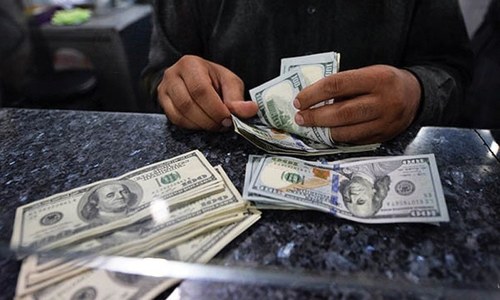REMITTANCES sent home by Pakistanis living and working abroad continue to surge, defying the economic slowdown resulting from the Covid-19 pandemic. State Bank data shows that diaspora remittances jumped by a hefty 29pc to an all-time high of $24.2bn during the 10-month period between July and April of the ongoing financial year when compared to the cash sent home by overseas Pakistanis during the same period a year earlier.
April saw remittances spike to an unprecedented $2.8bn, up by a whopping 56pc from the previous year. The 10-month aggregate has also exceeded expectations and the full level achieved in the last fiscal year by over $1bn. Saudi Arabia continues to be the largest source of remittances to Pakistan followed by the UAE, UK, EU and the US. Pakistan is now in sixth position amongst the top 10 recipient countries of workers’ remittances globally, and is likely to move up at least one place by the end of this year.
The central bank claims that proactive policy measures to encourage more flows through formal channels, curtailed international travel, altruistic transfers to Pakistan amid the health crisis, orderly forex market conditions and, more recently, Eid-related inflows contributed to the surge in remittances. This continuing growth has also lessened concerns of an economic slowdown in countries hosting the largest pool of Pakistani workers, which had caused remittances to dip at the start of the pandemic. In its new report, the World Bank has attributed the steady remittance flows to fiscal stimulus that resulted in better-than-expected economic conditions in the host countries, the shift in flows from cash to digital and from informal to formal channels as well as cyclical movements in currency exchange rates and oil prices. The 17pc growth in remittances to Pakistan in 2020 was faster than the combined 5.2pc increase flows to other South Asian nations, says the World Bank.
Read: The tale of rising remittances
Workers’ remittances are the single largest source of foreign currency for Pakistan ahead of exports. They provide key support to currency and forex reserves by bridging the balance of payments in the face of reduced dollar flows from other sources. The rising remittance flow has so far helped support the current account that has posted a surplus of $959m, creating a semblance of external-sector stability. But the contributions of expats can do only so much. The other important component — financial account — of the balance of payments continues to be in deficit as FDI plummets, equity investors pull out their money from stocks, foreign debt payments jack up, and amortisation and other outflows increase. Overall, the external sector appears stable for now and the government is unlikely to face any difficulty in financing its debt and other payments for the next year or two. But the long-term external sector outlook will remain fragile without a dramatic increase in exports and direct investment inflows.
Published in Dawn, May 21st, 2021













































